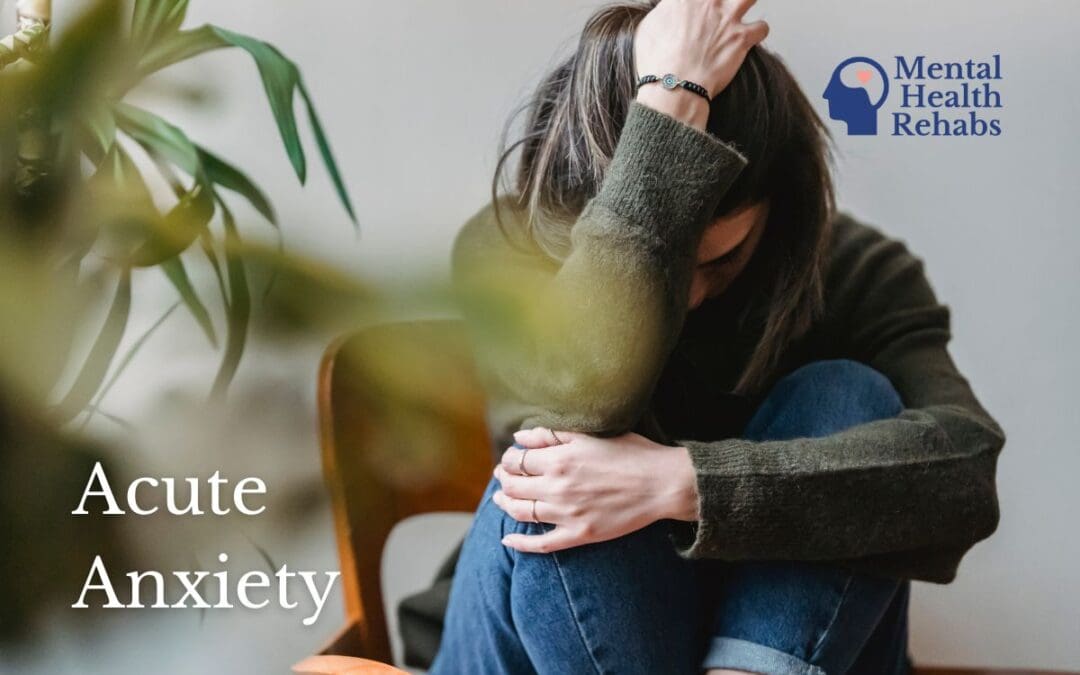The term acute anxiety is relatively informal and generally refers to a panic attack, a sudden and unexpected episode of intense fear that causes multiple physical and psychological symptoms. This type of anxiety is extremely stressful and often makes people feel like they’re losing control. People who have severe acute anxiety attacks or constantly live in fear of an anxiety attack may be diagnosed with a panic disorder.
Symptoms Of Acute Anxiety
The signs and symptoms of acute anxiety are based on panic disorders. People with panic disorders tend to have frequent and unexpected acute anxiety attacks. These are periods of intense fear, discomfort, or a sense of losing control – even though there is no apparent danger or trigger.
During a panic attack, you may experience:
- Fast heart rate
- Hyperventilation (rapid breathing)
- Profuse sweating
- Trembling or tingling
- Chest pain
- Feelings of nervousness, restlessness, danger, or impending doom
- Feeling like you can’t control yourself
- General weakness
- Inability to think about anything other than your worries
- Having trouble sleeping
- Gastrointestinal issues
Causes Of Acute Anxiety
The causes of anxiety disorders aren’t fully understood. For the most part, it’s a combination of various risk factors that are genetic and environmental. The risk factors for each type of anxiety disorder vary, but general ones include:
- Traumatic and stressful life experiences may lead to anxiety disorder in people who are naturally more vulnerable to them, like those who suffer from severe shyness in new situations as children.
- A family history of anxiety disorders increases the chances of suffering from one. Genetic risk factors may contribute to the likelihood of suffering anxiety disorders.
- Multiple medical conditions, such as thyroid problems or heart arrhythmias, can contribute to the onset of anxiety disorders.
- Withdrawal from anti-anxiety medications like benzodiazepines may lead to episodes of severe anxiety. Side effects from caffeine, tobacco, sugar, and other substances may also increase the risk of suffering bouts of anxiety.
Treatment and Therapies
Anxiety disorders can be treated with psychotherapy, medication, or both. There are many ways to treat acute anxiety, and you should always work with a mental health specialist to choose the best treatment for you.
Psychotherapy
Cognitive behavioral therapy (CBT) is the most effective psychotherapy for anxiety disorders. CBT counselors help people with anxiety modify the beliefs and behaviors that may lead to worse symptoms. These coping skills enable managing triggers and contribute to improving quality of life.
Medication
Anti-anxiety medication, antidepressants, and beta-blockers help reduce the severity of anxiety symptoms. They work by changing brain chemistry to manage mood and stress (antidepressants), directly reduce symptoms (anti-anxiety medications like benzodiazepines), and manage physical symptoms of shaking and rapid heartbeat (beta-blockers).
Still, they don’t fully cure anxiety on their own. Medication is usually only effective when used in conjunction with psychotherapy.
Stress Management Techniques
Learning stress management techniques such as exercise and meditation can also help reduce anxiety symptoms for some people with acute anxiety. Some coping mechanisms can help ease anxiety symptoms:
- Breathing techniques: Hyperventilation is one of the most common symptoms of acute anxiety attacks. Breathing faster makes you feel like you’re short of breath and makes you breathe in more, turning into a vicious circle. Focus on slower, longer, and calmer inhalations and hold them briefly before releasing them.
- Meditation: Meditating for approximately 10 minutes a day can lead to significant improvements within weeks. You can even use mobile apps to set up quick meditation sessions anytime.
- Grounding: Techniques focus on connecting your mind and body with where you are. The “five senses” or “5-4-3-2-1” method, where you take a few minutes to list five things you can see, four things you can feel, three things you can hear, two things you can smell, and one thing you can taste.
How To Prevent or Reduce Acute Anxiety Attacks
Reducing the frequency of acute anxiety or panic attacks comes down to practicing coping techniques like the ones discussed above and following treatment.
You can use these strategies to prevent acute anxiety attacks or reduce their frequency:
- Remind yourself that the attack will eventually pass
- Use breathing, relaxation, and grounding techniques to stay present
- Repeat a mantra that gives you strength or helps you focus
- Walk, exercise, or try muscle relaxation techniques
- Imagine being in a calm place
- Take your medications as prescribed
- Discuss your feelings with someone you trust
When To Seek Professional Help For Acute Anxiety
Everyone suffers anxiety at some point in their lives. Many will even suffer panic attacks, but the persistence of the symptoms makes anxiety disorders different from getting anxious. Whether you need a doctor to handle your anxiousness depends on its severity. You should consider seeing a doctor if you experience the following:
- Your worries interfere with your work, relationships, and other areas of your life
- Your fears are difficult to control, and don’t go away alone
- You have additional mental health concerns, like depression
- You misuse alcohol or drugs to cope with anxiety
- Your symptoms of anxiety may be linked to a physical illness
- You experience suicidal thoughts
Don’t let the stigma associated with a mental illness prevent you from doing what’s best for your health and well-being. Speak with a mental health specialist today about your worries and determine the best course of treatment for you.

